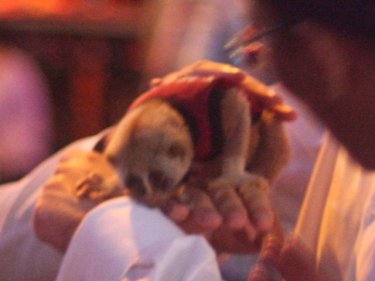Acceptance of kickbacks by local police makes enforcing the law impossible, the organisation says, listing the results of a fresh survey in Patong, on Phuket's west coast.
''Phuket still hell for protected wildlife,'' is the heading on a report that says 23 protected creatures were encountered in one night.
The group says that eight months ago, the Natural Resources and Environmental Crime Division of the Royal Thai Police, with the Department of National Parks, reported that three touts had been arrested with slow lorises on Patong's Soi Bangla walking street.
''We were further informed that the exploitation of illegal wildlife would not be tolerated by those organisations and local police,'' the foundation says in a statement.
''Unfortunately we received many complaints again in the last two months that the same people were again back on the roads of Patong with lorises, gibbons and other protected wildlife.
''The local police commander of Katu police station [which oversees Patong] however told us by phone last week that these complaints were untrue and that no wildlife was being paraded around.
''After receiving photos taken within this month we decided to go and check out the area ourselves.
''We are shocked to have found an increased amount of animals last night with a total of 23 'protected and endangered wild animals' in total, 19 lorises, two gibbons and two Phayre's Langurs [a small leaf monkey native to SE Asia].
''All were paraded around as photoprops, tourists paying 200-500 baht per photo-session. The loris, gibbon and langur are protected under local laws as well as CITES appendix 1, which prohibits possession, local and international trade.''
The organisation now plans to take its findings to Phuket's Governor, the Department of National Parks and national police.
The group wants ''to stop this practise, confiscate the animals and bring the 'owners' to court.''
According to the report, locals in Patong say police are paid off to allow the animals to be used, although laws prohibit their exploitation.
Reaction among tourists are mixed. Those with a knowledge of animals and the environment shun the touts.
Others from countries where wild animals remain playthings pay for the thrill of handling a cute creature.
Although Phuket is free from rabies, the danger remains of an infected animal being brought onto the island and inflicting a bite or a scratch.
The Wildlife Friends Foundation Thailand (wfft.org) is a registered foundation under Thai law,which aims at resucing wild animals, educating people about issues, preventing hunting and promoting conservation.





The 2 Eagles on show at Kata Viewpoint remain there for photo-ops, regardless of what the police says.
I tried to explain to a Danish tourist 2 days ago that these are endagered and protected species and by taking a picture of his wife with them only aggravates the problem. He didn't seem to care and said nothing.
I had to speak in Swedish (which all Danes understand if they want to) because if the bird handler understood what I said, there would certainly be consequences for me.
I would suggest warning signs to be put around known hotspots for animal abuse explaining why and what so tourists would be made aware and hopefully would not endorse this despicable abuse and exploitation.
I would like to hear the excuses of local administration for not agreeing to put up such signs.
Posted by Andrew on February 23, 2013 11:10
Editor Comment:
Aren't there are enough signs competing for tourists' attention already? Doesn't the idea of enforcement work for you?